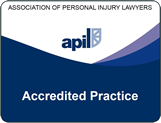Accidents at Work – What Are My Rights?
If you have had an accident at work, it can sometimes seem daunting to make a claim against the people who employ you. It is worth remembering, however, that by law all employers must have a valid policy of employers liability insurance. This requirement is contained in the Employers Liability (Compulsory Insurance) Act 1969 and applies to almost all employers no matter what the size of the organisation.
Employers Liability Insurance is designed to cover the situation if an employee claims compensation for illness or injury that they believe has been caused by their work and it means that the claim you make should ultimately be paid out by the insurance company, not by the people you work (or used to work) for.
Am I an employee for the purposes of making a claim?
The first thing to consider is whether your accident happened at work. In many cases, this will be obvious, if you work for a substantial business, for example, and the accident happened when you were burned by a piece of malfunctioning office equipment. However, sometimes you might work freelance for small gardening or building firm, for example. The owner may tell you that you are self-employed but in many cases, you won’t be self-employed even if you pay your own tax or even if you work via an agency. In the vast majority of cases, people who are self-employed are actually employees for the purpose of accident compensation claims. We can help you identify the correct position in your situation using a tool we call ‘the badges of trade’.
It’s your fault!
Once it is established that you are an employee for the purposes of an accident at work claim, we have to look at whether or not it is likely to be the fault of the employer. In the first instance, do not be put off if you are told that the accident was your own fault or even if you are disciplined for misconduct. This is a tactic often used by employers to dissuade people from making claims. Some employers even claim not to have insurance in the hope that will put you off. On most occasions, this is simply an optimistic ruse that they think will stop you from making a claim. Even though there are in fact insured. As mentioned above, it is against the law not to have Employer’s Liability Insurance even if you have only one person working for you and even if that person is not full time.
So, once established that you are employed, you have had an accident at work and that it is likely to be your employer’s fault, what next?
Obviously, the first thing is to look after your health, making sure that you get the treatment that you need and not being pressurised into going back to work too soon.
You will, of course, need some income coming in and in that respect, check your contract of employment. If you have one, and you should, this might entitle you to Statutory Sick Pay (CSP). This may be more than you are entitled to under employment law, which is limited to SSP. SSP is currently just less than £100 per week so it might be a lot less than you are entitled to under your contract of employment. All employers must pay SSP if there is no other contractual sick pay.
If you have no right to SSP you might want to see if your employers will make ex-gratia or voluntary payments to you. After all, the fact that you are not at work is their fault. If this falls on deaf ears see whether you can use holiday to maintain your income whilst you are not at work.
You should also check your entitlement to universal credit and/or Industrial Injuries Disablement Benefit with the Department of Work and Pensions.
When you start to feel better, see if your employers will let you come back on ‘light duties’ or part-time so as to get some income coming back in.
If you do decide to make a claim we can in some cases obtain for you interim payments as the claim goes along, to replace your lost income. This does depend on liability for the accident clearly resting with your employers.
Other rights you have after an accident at work include:
- If the accident is considered serious the Health and Safety Executive (HSE) should be involved. Your employer should complete a RIDDOR form and send it to them. The HSE are also responsible for checking your employer is insured.
- If your employer does not report the accident to the HSE, you have a right to do so yourself.
- You have a right to a copy of the accident report and/or RIDDOR form. Do not feel pressurised into signing it, however. There is no requirement for you to do so.
- You have an ongoing right to your personal data which includes any CCTV footage of your accident. Make a subject access request (SAR) for the footage and any other personal data that might be relevant (taped phone, calls, text messages etc). Making a SAR is easy. You do not need to use any special form or template. You simply need to send a letter or email asking for your personal data and state what documents or recording you require. It won’t hurt to mention the Data Protection Act 2018 when you do. If the data, videos or papers are not provided then you can report your employer to the Information Commission (ICO).
Note: You are not entitled to certain documents produced for the purpose of your employer defending your claim, this is as opposed to an internal investigation report, which you are entitled to.
If you want any advice about the issues raised in this article or specifically about your own incident or accident at work claim please do not hesitate to contact Dominic Moss, Fellow of the Association of Personal Injury Lawyers, a highly experienced personal injury solicitor.
.


